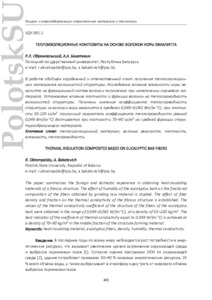Please use this identifier to cite or link to this item:
https://elib.psu.by/handle/123456789/25564Full metadata record
| DC Field | Value | Language |
|---|---|---|
| dc.contributor.author | Обромпальский, Р. Л. | - |
| dc.contributor.author | Бакатович, А. А. | - |
| dc.contributor.author | Obrompalsky, R. | - |
| dc.contributor.author | Bakatovich, A. | - |
| dc.date.accessioned | 2020-10-02T06:01:31Z | - |
| dc.date.available | 2020-10-02T06:01:31Z | - |
| dc.date.issued | 2020 | - |
| dc.identifier.citation | Обромпальский, Р. Л. Теплоизоляционные композиты на основе волокон коры эвкалипта / Р. Л. Обромпальский, А. А. Бакатович // Архитектурно-строительный комплекс : проблемы, перспективы, инновации : электронный сборник статей II международной научной конференции, Новополоцк, 28–29 нояб. 2019 г. / Полоцкий государственный университет ; под ред. Л. М. Парфеновой. – Новополоцк : Полоц. гос. ун-т, 2020. – С. 405-410. | ru_RU |
| dc.identifier.isbn | 978-985-531-701-3 | - |
| dc.identifier.uri | https://elib.psu.by/handle/123456789/25564 | - |
| dc.description | Секция III : Ресурсо- и энергосберегающие строительные материалы и технологии | ru_RU |
| dc.description.abstract | В работе обобщён зарубежный и отечественный опыт получения теплоизоляционных материалов волокнистой структуры. Исследовано влияние влажности коры эвкалипта на фракционный состав волокон получаемых при измельчении сырьевого материала. Установлено влияние плотности и фракции волокон на теплопроводность волокнистой структуры. Получены значения коэффициента теплопроводности структуры из волокон коры эвкалипта в пределах 0,049-0,062 Вт/(м·°С), при плотности 50-220 кг/м3. Наилучший показатель коэффициента теплопроводности равный 0,049 Вт/(м·°С) достигается при плотности 70-90 кг/м3 на средней фракции структурообразующего материала.=The paper summarizes the foreign and domestic experience in obtaining heat-insulating materials of a fibrous structure. The effect of humidity of the eucalyptus bark on the fractional composition of the fibers obtained by grinding raw material is studied. The effect of fiber density and fraction on the thermal conductivity of the fibrous structure is established. The values of the thermal conductivity coefficient of the structure of the fibers of the eucalyptus bark were obtained in the range of 0,049-0,062 W/(m·°С), at a density of 50-220 kg/m3. The best indicator of the coefficient of thermal conductivity equal to 0.049 W/(m·°С) is achieved at a density of 70–90 kg/m3 in the middle fraction of the structure-forming material. | ru_RU |
| dc.language.iso | ru | ru_RU |
| dc.publisher | Полоцкий государственный университет | ru_RU |
| dc.subject | Государственный рубрикатор НТИ - ВИНИТИ::ТЕХНИЧЕСКИЕ И ПРИКЛАДНЫЕ НАУКИ. ОТРАСЛИ ЭКОНОМИКИ::Строительство. Архитектура | ru_RU |
| dc.subject | Теплоизоляционный материал | ru_RU |
| dc.subject | Волокна эвкалипта | ru_RU |
| dc.subject | Плотность | ru_RU |
| dc.subject | Влажность | ru_RU |
| dc.subject | Теплопроводность | ru_RU |
| dc.subject | Heat-insulating material | ru_RU |
| dc.subject | Eucalyptus fibers | ru_RU |
| dc.subject | Density, Humidity | ru_RU |
| dc.subject | Thermal conductivity | ru_RU |
| dc.title | Теплоизоляционные композиты на основе волокон коры эвкалипта | ru_RU |
| dc.title.alternative | THERMAL INSULATION COMPOSITES BASED ON EUCALYPTIC BAR FIBERS | ru_RU |
| dc.title.alternative | Thermal Insulation Composites Based on Eucalyptic Bar Fibers | ru_Ru |
| dc.type | Article | ru_RU |
| dc.identifier.udc | 691.1 | - |
| Appears in Collections: | Архитектурно-строительный комплекс: проблемы, перспективы, инновации. 2019 | |
Files in This Item:
| File | Description | Size | Format | |
|---|---|---|---|---|
| Обромпальский Р.Л., Бакатович А.А-405-410.pdf | 427.37 kB | Adobe PDF |  View/Open |
Items in DSpace are protected by copyright, with all rights reserved, unless otherwise indicated.